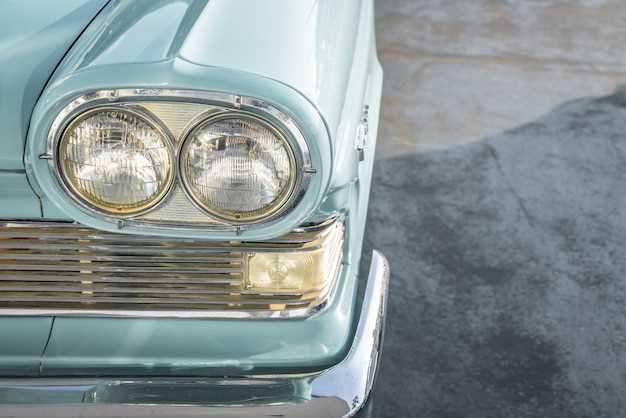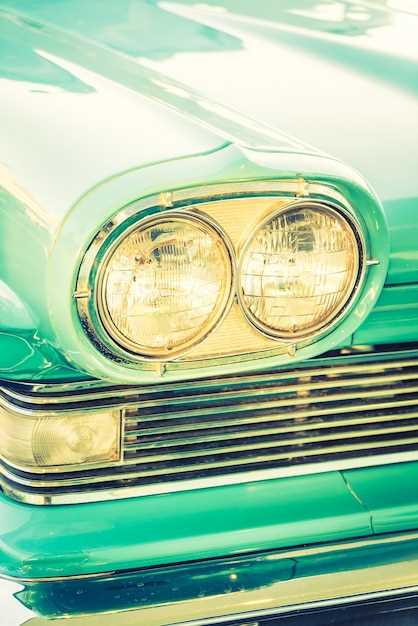
The world of vintage cars is not just a realm for enthusiasts; it also represents a complex market where the true value of classic vehicles can vary significantly. Understanding the estimation process is crucial for collectors and investors alike. Each vintage car carries a unique history that contributes to its overall appraisal, but several factors influence how these vehicles are valued in today’s marketplace.
One of the first steps in determining a vintage car’s worth is to conduct a thorough appraisal. This involves assessing various aspects of the vehicle, including its condition, rarity, and provenance. A well-maintained model with documented history can command a much higher price than one with a less distinguished background. Additionally, the emotional connection and nostalgia associated with classic cars cannot be overlooked; they often play a significant role in their perceived value.
Moreover, the vintage car market is dynamic, subject to trends and shifts in consumer interest. Factors such as restoration quality, market demand, and economic conditions can all impact how a classic vehicle is assessed. By examining these elements closely, enthusiasts and investors can gain a clearer understanding of what makes a vintage car not just a vehicle, but a potential investment that reflects both art and automotive engineering.
Understanding Key Factors in Vehicle Appraisal
Vehicle appraisal is a critical process that determines the true value of a car. Several key factors influence this valuation, each playing a significant role in the final assessment. Understanding these elements is essential for anyone looking to buy, sell, or insure a vintage car.
Condition is one of the primary determinants in vehicle appraisal. The overall state of the car, including its bodywork, interior, and mechanical components, greatly impacts its value. A vehicle that has been well-preserved or fully restored will often command a higher appraisal than one with significant wear and tear.
Another important factor is the car’s provenance. This includes the vehicle’s history, such as previous ownership, service records, and any rare features or modifications. A well-documented history can enhance the car’s desirability and increase its appraisal value.
Market demand also plays a crucial role in determining a vintage car’s value. As trends shift and certain models become sought after, their appraised values can skyrocket. Staying informed about current market trends is essential for accurate vehicle appraisal.
Rarity is yet another factor to consider. Limited production runs or exclusive models often have higher appraisal values due to their scarcity. Collectors are frequently willing to pay a premium for unique cars that are hard to come by.
Age is a significant element as well. Vintage cars often appreciate in value over time, especially if they are well-maintained. The age of a vehicle can attract collectors nostalgia, further increasing its appeal and appraisal value.
In summary, understanding the key factors in vehicle appraisal–such as condition, provenance, market demand, rarity, and age–enables stakeholders to accurately assess the true value of vintage cars. This knowledge is invaluable for making informed decisions in the classic car market.
Utilizing Market Trends to Gauge Classic Car Value

In the world of classic cars, understanding market trends is essential for accurate vehicle appraisal. The value of a classic car is influenced by numerous factors, including demand, rarity, and historical significance. Tracking these trends enables collectors and investors to make informed decisions regarding their investments.
One effective method for estimating the value of a classic vehicle is to analyze auction results. High-profile sales provide insight into what collectors are willing to pay, often reflecting broader market sentiment. A surge in interest for specific models can indicate rising values, prompting owners to reassess their appraisal approaches.
Another useful resource is online marketplaces, where current listings reveal real-time demand. By reviewing prices of similar vehicles, one can gauge whether a given classic car is undervalued or overvalued based on its specifications, condition, and historical context. Additionally, changes in consumer preferences can signal shifts in value, making it crucial to stay attuned to industry news and buyer trends.
Economic factors also play a significant role in classic car valuation. During periods of economic prosperity, collectors may be more inclined to invest in high-value vehicles, while economic downturns could lead to a decrease in market confidence. Understanding the intersection of economic indicators and classic car values allows for better appraisal outcomes.
Seasonal trends should not be overlooked either. Certain times of the year can see higher activity in classic car sales, often correlating with car shows or auctions. By aligning appraisals with these trends, appraisers can provide a more accurate value estimate reflective of current market dynamics.
Ultimately, utilizing market trends to gauge the value of classic cars requires a comprehensive approach. By integrating auction results, online sales data, economic conditions, and seasonal fluctuations, one can achieve a well-rounded appraisal that accurately reflects the true value of a vintage vehicle.
Best Practices for Conducting a Detailed Car Valuation

Conducting a detailed car valuation is essential for understanding the worth of a vintage vehicle. Begin by gathering comprehensive information about the classic car, including its make, model, year, and VIN. This data forms the foundation of an accurate assessment.
Next, assess the overall condition of the vehicle. Factors such as mileage, maintenance history, and any modifications made can significantly impact its value. A thorough mechanical inspection is advisable to identify any underlying issues that could affect the valuation.
Another critical aspect is to research the market trends for similar classic cars. Check auction results, classified ads, and online sales platforms to gauge what similar vehicles are selling for. This comparative analysis will provide a benchmark for the car’s value based on current demand and recent sales.
Document the car’s provenance, including previous ownership, restoration history, and any awards or recognitions. A well-documented history can enhance the vehicle’s appeal and justify a higher valuation. Consider obtaining a professional appraisal from a certified appraiser, especially for rare or high-value cars, as their expertise can provide an objective perspective.
Lastly, understand the economic factors affecting the classic car market, such as fluctuations in demand and collector interest. Keeping abreast of these trends can help refine your valuation and ensure it reflects the true market value of the vintage vehicle.




